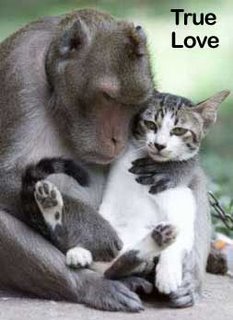Gene Duplication: A source of intellect?
` According to an article called Multiple copies of a mystery gene may make us human by Erika Check, Published online: 31 August 2006; | doi:10.1038/news060828-5....
` ...Nobody yet knows what the gene in question does, exactly, but thanks to genome sequencing, what researchers do know is that humans have more copies of it than chimps as well as macaques, rats and mice.
` All that is known for sure is that it makes a protein that is found in the human brain. Perhaps this is part of the reason why we're so damn smart!"This really is a remarkable discovery," says Thomas Insel, director of the US National Institute of Mental Health in Bethesda, Maryland, which was not involved in the research and did not fund it. "People are going to argue about it and be fascinated by this, because it takes us in a couple of directions we haven't really been in before."
` By comparing the DNA of primates with more distantly-related mammals, the researchers are slowly figuring out what makes primates - and humans! - unique!
` It seems nowadays that the numbers of copies of a particular gene is an important source of variation that natural selection works with, in addition to the mutations within genes.
` Looking for such repeats, James Sikela at the University of Colorado at Denver and Health Sciences Center, Aurora, discovered a gene that, in humans, is copied 212 times whereas chimps have only 37 copies and monkeys have only 30. Mice and rats only have a singly copy.
` This gene codes for a piece of protein known as DUF1220, which is found in many places in the human body, including the brain's neurons.
` Perhaps it has something to do with brain function? That would make sense, considering that we use our brains for more tasks than chimps do, chimps more than monkeys, and monkeys more than small rodents.
` So, how could anyone find out whether or not this is true? With mice, you can just knock out genes to tell what they do. ...But you can't do that with primates."These genes may be very good candidates to be involved in some type of cognitive function, and that's very tantalizing," Sikela says. "But that's about as far as we are right now."
` I'm sure someone will eventually figure out how true this most intuitive line of thinking is. In the meantime, we'll just have to do genetic experiments with primates the old-fashioned way.... ` Cross-species breeding!
` Cross-species breeding! ` Hey... it's early.
` Hey... it's early.




5 comments:
I just stole your monkey-dog. That's the best lookin animal I ever saw. LOL!
What I've always wondered is if sex between two different species of animals a form of bestiality.....
` Crabby: Glad you like. I got it in an e-mail from someone.
` Galtron: I dunno. Horses and donkeys are forced to have sex all the time in order to make mules. Is that horrible? Well, they're both the same genus, at least. Maybe that doesn't count.
` On the other hand, I once saw this nature program where a really desparate cheetah was humping an equally desparate lioness! They're not even the same genus! Plus, they're supposed to be mortal enemies! What the dilly?
` But is that any closer to bestiality? Well, perhaps not: In Star Trek, the different people who evolved separately on different planets not only have sex, but they have children too! (Such as Worf's half-human son, Alexander Roshenko.)
` ...Extreme biological implausibilities aside, perhaps the key to bestiality is intelligence, not genes. If Klingons and humans had sex, it is not bestiality because they're the same in intelligence and mutually understand one another's intentions, etc.
` As far as the monkey-dog (or, I'm guessing, ape-dog) goes, it probably is bestiality because apes are much smarter and could easily take advantage of dogs if they wanted. ...Unless, perhaps the dog was the one who started it. After all, it's not bestiality when an animal is dishing it out, though it is when it's on the receiving end.
` Then, maybe not.
` ...Oh, I don't know!!! My brain!!!
` Glad you feel safe enough here to come back ^^
` And for the record, Klingons do have those things: They don't use them terribly often because of the way they're socialized.... Yeah, that's it!
Post a Comment